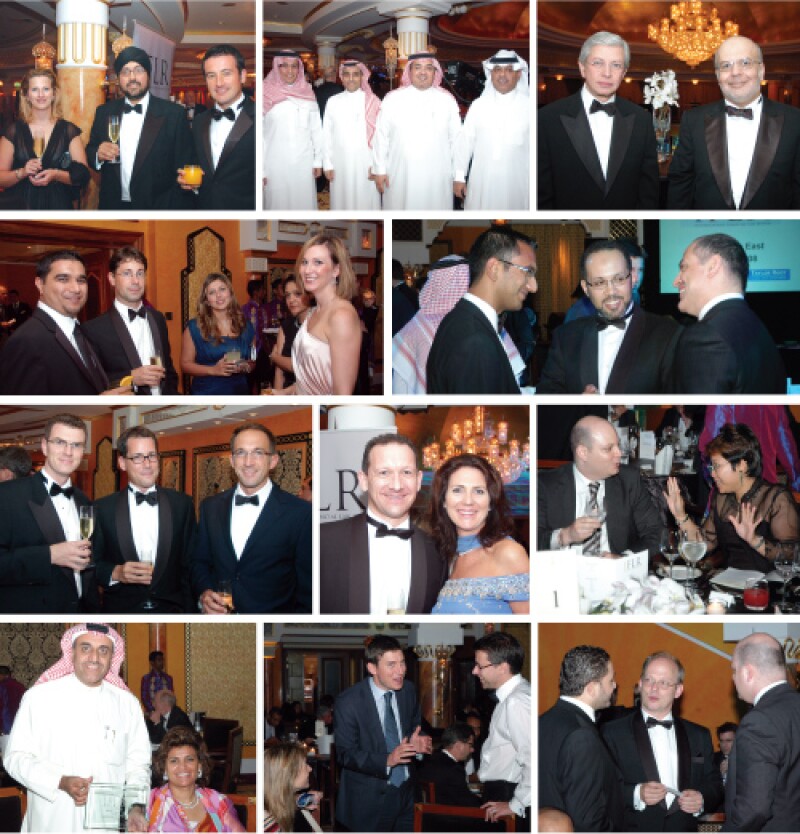

As anyone who has won IFLR law firm of the year can testify, it's hard to top the feeling of exhilaration the accolade brings. But being congratulated by underwear model Victoria Silvstedt (right) certainly helps, and the Linklaters partners who celebrated in the Burj Al Arab bar after the awards were lucky enough to have Miss Silvstedt on hand to round off the evening. Photos of the event itself have mysteriously disappeared. Earlier, the night had passed off successfully, the biggest Middle East awards yet. One local partner commented: "This has basically become the legal event for the region. Well done."
Middle East law firm of the year
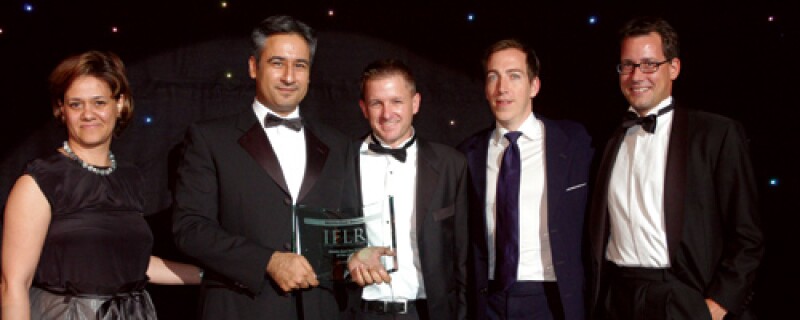
|
Linklaters
Linklaters won Middle East law firm of the year for an impressive year across several practice areas. For a relative newcomer to the region, and a relatively small office, the firm was on an impressive number of nominated deals and deal categories.
On the right, Tahir Jawed of Maples and Calder (second from left) congratulates Luma Saqqaf, Scott Campbell, Jason Manketo and Nick Garland from Linklaters.
In-house counsel team of the year
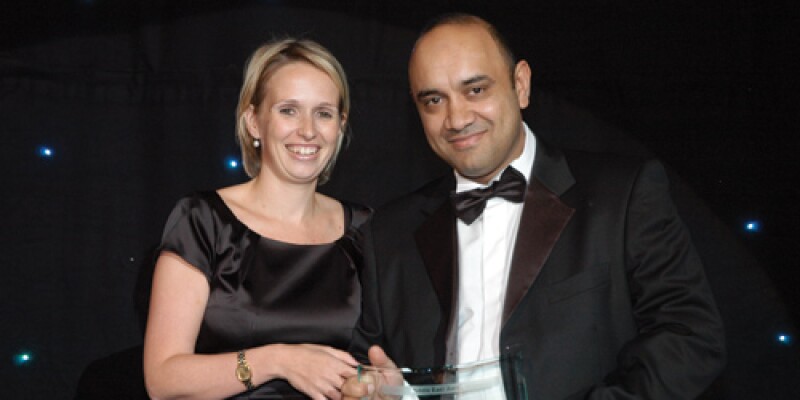
|
Morgan Stanley
Claire Walters of Taylor Root presents the award for in-house counsel team of the year to Pervez Akhtar, of Allen & Overy but now moved to Dubai investment firm Abraaj Capital.
Allen & Overy advised Morgan Stanley on several of the deals that contributed to them winning the award, and so collected the trophy of the bank's behalf.
Corporate counsel award
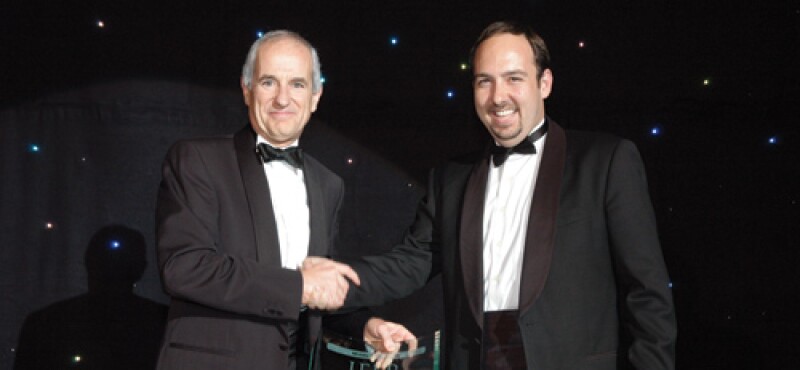
|
Clyde & Co
This year's Middle East awards featured a new category, the Corporate Counsel Award. This was organised through the Dubai Corporate Counsel Group, which asked its members to name the law firm they thought consistently demonstrated the highest level of innovation in Dubai. By far the most popular names were Clyde & Co and Freshfields Bruckhaus Deringer, with the former just receiving more nominations.
On the right, Justin Connor of the Group presents the award to Clyde & Co's Jonathan Silver.
Debt and equity-linked team
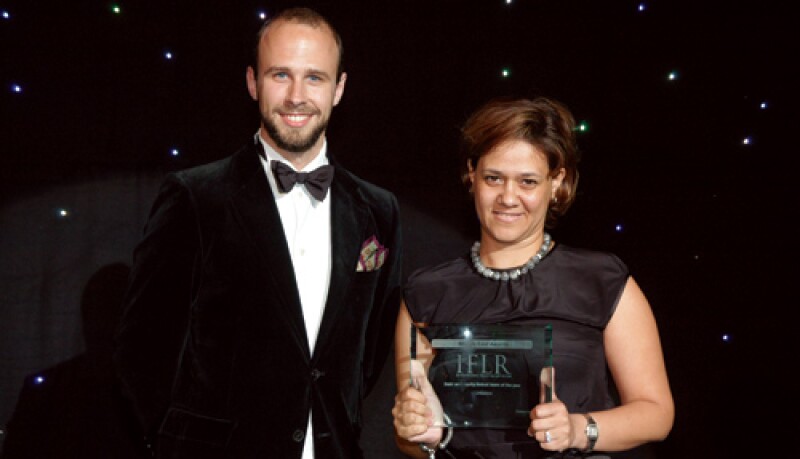
|
Luma Saqqaf of Linklaters receives her award (for the second year running) from IFLR editor Simon Crompton |
Linklaters
Other nominated firms:
Allen & Overy; Clifford Chance
Herbert Smith; Norton Rose
Linklaters' work this year shows why it is such a respected firm for debt and equity-linked deals in the Middle East. Of the deals shortlisted, the firm worked on four of six.
Highlights include the firm's key role assisting Tabreed on the UAE's first mandatory exchangeable sukuk. Local law issues that require companies with such sukuk to offer investors a cash option were overcome by introducing a trustee at the SPV level to exercise this option on behalf of investors immediately after issuance. The firm further proved its prowess at handling innovative transactions with a role advising the trustee, Deutsche Bank, on Tamweel's securitisation.
Linklaters also scooped a mandate on one of the largest transactions of 2007 – DP World's simultaneous sukuk and MTN programme. Linklaters also assisted the managers on Dana Gas's $1 billion sukuk.
Equity team
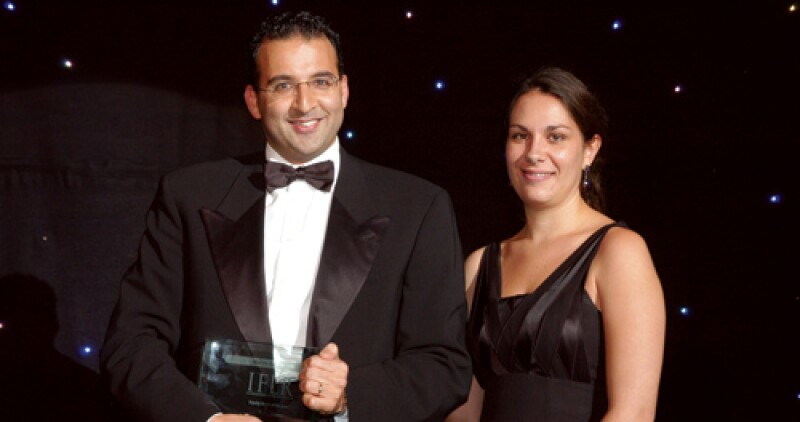
|
Khalid Garousha of Allen & Overy receives his award from IFLR's Rachel Evans |
Allen & Overy
Other nominated firms:
Al Tamimi & Company
Clifford Chance; Linklaters
Allen & Overy's equity team has worked on a diverse body of work this year. The firm has shown its ability to work in jurisdictions across the Middle East and on different types of equity offering.
The firm was involved in one on the most exciting equity deals to come out of the UAE this year – Depa's $430 million IPO. This deal took advantage of a new law that allows DIFC SPVs to list 100% of a company's shares on the DIFX. Foreign ownership restrictions however still apply, so a custodian was built into the structure to monitor share ownership and force a sale of securities.
A&O also assisted the company in Saudi Arabia's first rights issue under new legislation. Sipchem's offering in February took advantage of the regulation that allows companies to sell on the shares that so-called lazy investors fail to take up in a rights issue.
M&A team
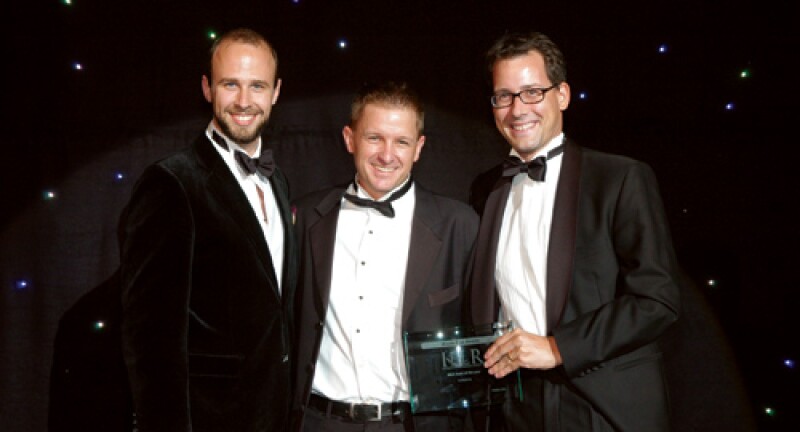
|
Simon Crompton presents the M&A team of the year award to Scott Campbell (left) and Nick Garland (right) |
Linklaters
Other nominated firms:
Allen & Overy
Clifford Chance
Freshfields Bruckhaus Deringer
Linklaters also had an impressive year in M&A; it worked on three of the four shortlisted deals of the year. It advised Emirates Bank International on its $11.3 billion merger with the National Bank of Dubai, the Dubai Government and Borse Dubai on its acquisition of OMX and subsequent sale of OMX to Nasdaq and related transactions with Nasdaq (including the sale of 33.3% of DIFX) and Saudi Oger and Oger Telecom on the sale of a 35% stake to Saudi Telecom.
The firm also acted for Dubai International Capital on a number of transactions including the acquisitions of Almatis and Alliance Medical.
Project finance team
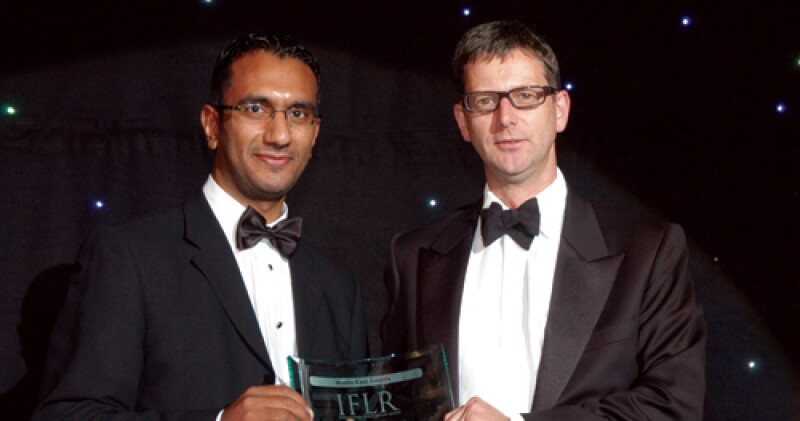
|
Qudeer Latif and Malcolm Turner of Clifford Chance receive their award |
Clifford Chance
Other nominated firms:
Al-Jadaan & Partners
Allen & Overy
Baker & McKenzie
Norton Rose
Saudi Arabia has provided the bulk of Clifford Chance's most challenging deals over the past 12 months. The firm received three nominations for project finance deal of the year, all for deals in the kingdom.
The firm counselled the sponsors on Saudi Kayan's petrochemicals project, which became the largest to be completed in Saudi Arabia when it closed in June. The firm also assisted the banks on the $5.52 billion Ma'aden phosphate project, guiding the institutions through the two Islamic facilities and their different exposures. And Clifford Chance assisted the off-taker on Shuaibah's expansion.
Other work this year includes guiding the Export Import Bank and commercial lenders on the $3.5 billion NCP Saudi Chevron project. And the firm showed that its expertise is not restricted to Saudi, advising on the Sur IWP and Qatargas 4.
Debt and equity-linked
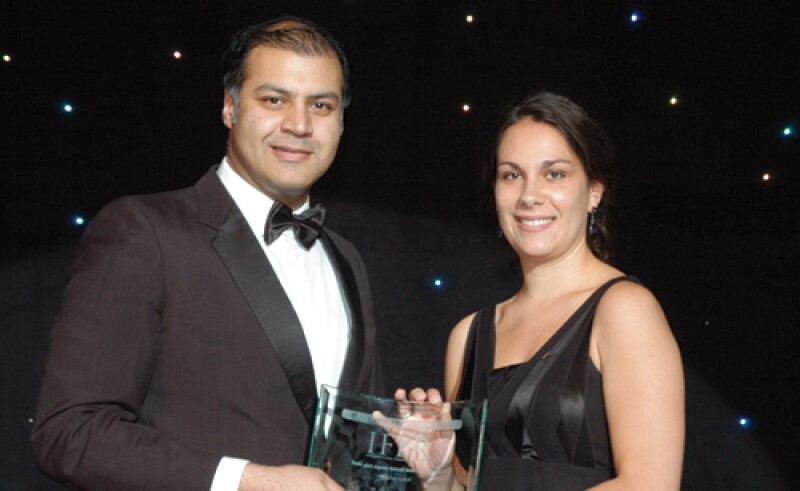
|
Nadim Khan of Herbert Smith collects his award from IFLR's Rachel Evans |
Villamar
In the wake of Aaoifi's concerns about musharaka-backed sukuk, structures have been going back to basics. The $190 million Villamar sukuk showed that innovation is still possible in Islamic finance.
Unlike previous structures, this musharaka got rid of the purchase undertaking that has worried shariah scholars. The borrowing entity is not obliged to buy out the issuer should the transaction go wrong. Instead, the payments to sukuk-holders were characterised as an expense, like construction costs, and structured through account and cash management. This required an analysis of the rights of investors versus other costs, and how the cash waterfalls would work. The structure unusually gave sukuk-holders a stake in the project itself, rather than in a corporate backing the development.
Gulf Holding Company was advised on Kuwaiti law by Ali Radwan and Partners and on Bahraini matters by Haya Rashed Al Khalifa. Merrill Lynch was assisted by Herbert Smith with assistance on Bahrain issues from Hatim S Zu'bi & Partners and on Cayman issues from Walkers. Herbert Smith also represented Deutsche Bank as trustee. Trowers & Hamlins counselled Khaleeji Commercial Bank.
The runners-up
Dana Gas sukuk
Dana Gas's $1 billion sukuk at the end of October 2007 was the first forward-starting convertible in the Middle East. However, the conversion formula was not included in the terms and conditions, but instead set nine months after closing. The size of the deal had to be increased twice, showing the extent of investor demand for this product.
Clifford Chance advised Dana Gas on the Islamic structuring, as well as English and UAE law. Linklaters assisted the joint lead managers on English law relating to the sukuk while Lovells provided guidance on Islamic structuring and UAE law. Bedell Cristin helped with Jersey law advice.
DP World MTN and sukuk
In July 2007, DP World established a $5 billion global medium-term note programme. At the same time, it issued $1.75 billion of notes from the programme, as well as a $1.5 billion sukuk al mudaraba. The programme and sukuk had to be cleared for sale in the US, but as this was only the second sukuk to be offered to US investors, the regulators had to be made comfortable.
The sukuk had the same credit risk and terms and conditions as the bonds issuedand showed that sukuk can sell as well as bonds. Clifford Chance assisted DP World on both the sukuk and MTN programme; Linklaters represented the manager, Deutsche Bank. Maples and Calder assisted the Cayman SPV issuer of the sukuk.
SEC sukuk
Despite doubts cast on the future of such structures by Aaoifi's (Accounting and Auditing Organisation for Islamic Financial Institutions) pronouncements on the compliance of some sukuk models, Saudi Electricity Company's sukuk in July 2007 was undoubtedly innovative. The SR5 billion ($1.33 billion) certificates were backed by intangible assets, in this case the right to generate revenue from reading meters.
Baker & McKenzie advised the issuer, Saudi Electricity Company. Clifford Chance assisted HSBC Saudi Arabia while Al-Jadaan & Partners provided local advice.
Tamweel RMBS
This groundbreaking transaction last July was the first true-sale shariah-compliant securitisation in the Middle East. All previous Islamic securitisation-type transactions have been cash-collateralised.
The securitisation was backed by ijara but property laws in the UAE prohibit non-local institutions from owning property. An SPV was therefore set up in the DIFC that is recognised by the Dubai Lands Department as a local entity. The ijara were sold to the DIFC vehicle which then sold the rights to the revenue from the leases to a Cayman structure which issued the sukuk. Tranching was obtained by noteholders agreeing amongst themselves to a subordination regime that was stated in the terms and conditions.
Allen & Overy assisted Tamweel. Denton Wilde Sapte represented Morgan Stanley and Standard Chartered as the joint managers. Norton Rose counselled the DIFC SPV, while Turner & Roulstone guided the Cayman issuing vehicle. Linklaters helped Deutsche Bank, the trustee.
Tabreed
This deal in May was the first mandatory exchangeable sukuk in the UAE. Local law stipulates that investors should be given a cash option when the sukuk flips. So in this deal the trustee of the issuing SPV exercised the option of investors at the moment of issuance, choosing shares.
Shariah concerns regarding rights in the event of a default were also raised. In such a situation, a company with an exchangeable sukuk would usually pay cash. This however was not an option for Tabreed's sukuk due to its mandatory nature. To solve this problem, a mechanism was created that requires Tabreed to put more assets into the SPV in the event of an insolvency, under the proviso that these are then sold straight back to Tabreed.
Linklaters provided English and UAE advice to Tabreed while Allen & Overy assisted Morgan Stanley, Standard Chartered and National Bank of Abu Dhabi as joint lead managers. The firm also guided the delegate, BNY Corporate Trustee Services, on English and UAE law. Walkers assisted with Cayman law advice.
Equity deal
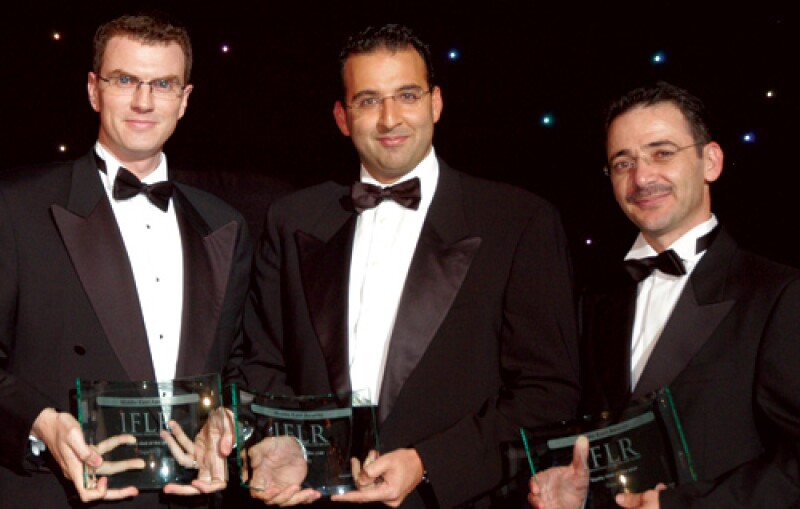
|
From left to right: Richard O'Callaghan of Linklaters, Khalid Garousha of Allen & Overy and Husam Hourani of Al Tamimi & Company |
Depa IPO
This groundbreaking $430 million deal in April was the first listing by a private UAE company on the DIFX. Previously a law on the foreign ownership of securities had restricted the listing of companies on international exchanges.
In the past, companies could go public by listing on a local exchange after converting into a joint stock company, and only then could they list on the DIFX. Even after fulfilling these requirements, companies could only list 49% of their shares on an international exchange; 51% of shares must remain with UAE nationals.
However, in 2007, a new law enabled 100% of an SPV domiciled in the DIFC to be listed. So Depa flipped into a DIFC SPV which then listed 100% of shares on the DIFX.
Restrictions on foreign ownership of shares still apply, so this structure incorporated a custodian to monitor the 51% threshold and a mechanism to force foreign shareholders to sell to a UAE national if this is breached.
Allen & Overy advised Depa on its IPO with Al Tamimi & Company providing counsel on UAE and DIFC law.
Cleary Gottlieb Steen & Hamilton assisted the financial advisers, Morgan Stanley, UBS, TNI and Global Investment House. Linklaters represented the depository.
The runners-up
DP World IPO
DP World's $5 billion IPO in November was the largest IPO in the Middle East to date. As well as size, the deal was a showcase for complexity, as the IPO triggered a convertible sukuk structured two years previously.
This created a number of difficulties, not least because the conversion calculations and the ratio of shares to cash options depended on the success of the IPO. This meant that the number of shares available shifted as the offering progressed.
The deal also marked the DIFC's first retail offering to UAE and eligible GCC nationals. Clifford Chance advised DP World with Al Tamimi & Company giving assistance on certain matters of UAE law. Linklaters guided Deutsche Bank and Merrill Lynch, while Herbert Smith assisted Millennium Finance Corporation. The banks collectively acted as joint lead managers.
Project Genesis GDRs
For Project Genesis, Global Investment House issued $1.14 billion of global depository receipts on the London Stock Exchange.
This was the first issuance of GDRs by a Kuwaiti entity. For the purposes of this transaction, one GDR represented the right to receive five shares in Global Investment House.
The novelty of the deal meant extensive discussions with the Kuwaiti regulators. The deal resulted from a change to the tax law which clarified the fact that profit made from trading shares on the Kuwaiti exchange was not subject to tax. The regulations were due to be amended further so close communication with the authorities was essential to ensure that this did not impact on the deal.
Clifford Chance assisted the issuer with English law advice while Al-Sarraf & Al-Ruwayeh advised on Kuwaiti matters. Linklaters and Bader Saud Al-Bader & Partners guided HSBC as the sole global coordinator, as well as Deutsche Bank, HSBC, JP Morgan and UBS as joint bookrunners.
Sipchem rights issue
Sipchem's rights issue in February was the first to go through under Saudi Arabia's new structure for such offerings.
The CMA (Capital Market Authority) approved the structure after two years of consultation. In rights issues, so-called lazy shareholders sometimes fail to take up the offer of additional shares. Under the new regulations, Saudi Arabian companies can now offer these shares to other investors.
Lazy shareholders receive compensation for the additional shares they don't take up. Previously, companies would issue fewer shares in rights issues and IPOs if demand was limited to prevent underwriters getting left with too much stock.
Allen & Overy assisted Sipchem on the deal with Al-Jadaan & Partners providing local Saudi advice. Clifford Chance represented the lead manager, NCB Capital Company, Riyad Bank as lead underwriter and Morgan Stanley who acted as financial adviser.
M&A deal
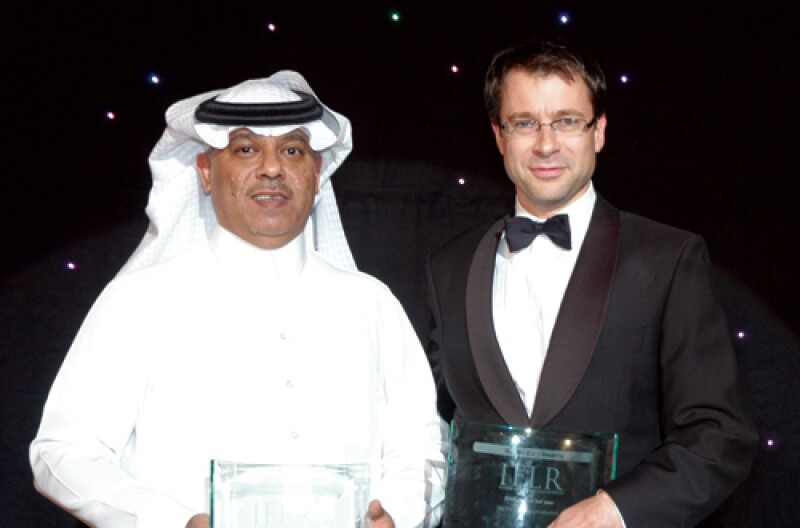
|
Abdullah Al-Hashim, partner and head of corporate at Al-Jadaan & Partners, collects his trophy alongside Nick Watson of Clifford Chance |
Saudia catering privatisation
Saudi Arabian Airlines' privatisation of its catering business may not have appeared on everyone's radar this year, but it contained an innovative legal structure that helped overcome an issue with Saudi law while remaining shariah-compliant.
In order to legally commit buyers to shares in the newly privatised company earlier, potential buyers were required to bid for shares before the catering section had been hived out of Saudia. But in Saudi Arabia, it is illegal to create a legally binding contract over something that does not exist at the time the agreement is entered into.
The legal teams therefore shunned a sale and purchase agreement and instead got the successful bidder to sign a process and escrow agreement. This meant that all documents were held in escrow with a large deposit until conditions were met. The agreements didn't become valid until they were released from escrow. The final condition was the transfer of shares.
Al-Jadaan & Partners and Clifford Chance represented Saudi Arabian Airlines.
The runners-up
Nasdaq/DIFX
Nasdaq's $4 billion acquisition of 33.3% in the Dubai International Financial Exchange (DIFX) was not simply a strategic stake-building exercise. In addition to the transactional documents, the legal teams had to negotiate and draft documents for the complex cross-border arrangements which will see Nasdaq provide DIFX with the Nasdaq brand, OMX technology and marketing resources.
The transaction was part of a bigger deal brokered between Nasdaq and Borse Dubai's sovereign wealth owners. In May 2007, Nasdaq put in a recommended cash and stock offer for OMX (owner of exchanges in the Nordic and Baltic regions), but this was disrupted by the sovereign wealth fund. Discussion commenced and an alliance was agreed. Borse Dubai would get a 19% share in Nasdaq (with economic rights to a further 8%) and Nasdaq got control of OMX and a 33.3% stake in DIFX.
Allen & Overy and Skadden Arps Slate Meagher & Flom advised Nasdaq. Gibson Dunn & Crutcher and Linklaters represented Borse Dubai. Clifford Chance advised on the financing of the deal.
National Bank of Dubai/Emirates Bank International
The $11.3 billion merger of National Bank of Dubai and Emirates Bank International created the largest bank in the GCC by assets. With both parties being listed entities, it was also the first securities exchange tender offer in the United Arab Emirates.
The transaction was done despite the lack of a takeover code and all parties held long negotiations with the Ministry of Economy, the Emirates Securities and Commodities Authority, the Central Bank and the Dubai Financial Market to set a benchmark. In total, the legal teams successfully obtained six waivers from existing legislation to enable the deal to go through. The process was completed when a new holding company was created that acquired both banks before listing on the exchange.
Allen & Overy and Linklaters advised National Bank of Dubai and Emirates Bank International respectively. Freshfields Bruckhaus Deringer represented Goldman Sachs on the transaction.
Saudi Telecom/Oger
Saudi Telecom Company's $2.56 billion purchase of a 35% stake in DIFC-incorporated company Oger Telecom from Oger Telecom Saudi Arabia and its parent Saudi Oger saw some of the region's biggest communication players sitting at the same table.
The interest was not just the tense negotiation though. Added complexity arrived in the form of Türk Telecom (one of Oger Telecom's subsidiaries) undergoing an initial public offering midway through the purchase period. The transaction also triggered an offer to convertible bond holders in South Africa. Finally, Oger Telecom was co-owned by a large number of sophisticated investors including Hermes, Deutsche Bank and Dubai International Capital. The share purchase triggered the requirement to make separate offers to all of those shareholders.
Freshfields Bruckhaus Deringer advised Saudi Telecom Company, while Linklaters represented Saudi Oger and its subsidiary Oger Telecom Saudi Arabia.
Project finance deal
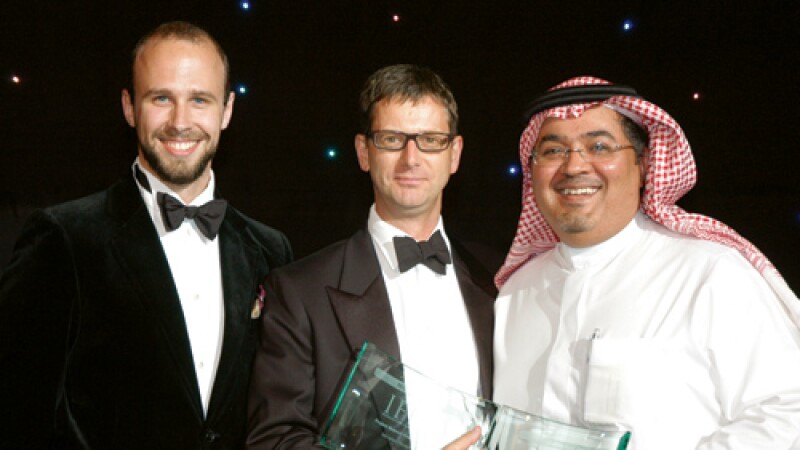
|
Simon Crompton with Malcolm Turner of Clifford Chance and Abdulaziz Al-Abduljabbar of Al-Jadaan & Partners |
Ma’aden phosphate
This $5.52 billion phosphate project in Saudi Arabia was financed by two separate Islamic tranches, in the largest Islamically financed project to date.
The separate facilities were introduced to interest a wider number of investors in the deal. One $650 million facility was structured with specific reference to a particular asset. The other $1.1 billion shariah-compliant facility was structured slightly differently to reference a proportion of the overall plant.
The deal also used funds from two export credit facilities, Korean Export Insurance Corporation and Export Import Bank of Korea, as well as Saudi Arabia's Public Investment Fund (PIF) and the Saudi Industrial Development Fund (SIDF). A conventional facility was also provided.
Baker & McKenzie counselled the joint sponsors. Clifford Chance assisted 20 commercial and Islamic institutions. Al-Jadaan & Partners provided Saudi legal advice to the banks and export credit agencies.
The runners-up
Emal Aluminium smelter
This $6 billion aluminium smelter project in the UAE used an unusual musataha structure instead of leasehold to secure the lenders' mortgage interest. The Islamic structure mirrors a usufruct and has rights of return. As a result, the land and the plant will be returned at the end of a fixed term.
The project was a joint venture between the Dubai and Abu Dhabi governments, raising the issue of sovereign immunity if the project failed. The sponsor's shareholders instead gave completion guarantees rather than rely on other forms of government support. Allen & Overy and Sullivan & Cromwell both acted for the borrower, Emal, while White & Case and Hadef Al Dhahiri counselled the lenders.
Karo Aromatics
This $2 billion deal by Kuwait Paraxylene Production Company, a joint venture by three Kuwaiti sponsors, is the first oil or gas project in the country to be completed without an international sponsor.
The project was financed with an Islamic and conventional facility, another first for Kuwait. Islamic institutions needed to take risk on the project by owning the assets, while the conventional institutions were used to get exposure to vehicles.As a result, provisions for how the Islamic institutions would react under certain circumstances were written into the contract to give comfort to the conventional backers. And if conventionals were to be compensated after a late interest payment, for example, the documents had to provide for Islamic institutions to receive similar remuneration to ensure neither party had an unfair advantage.
Linklaters advised the project company with International Counsel Bureau providing Kuwaiti law advice to the borrower. Norton Rose represented the lenders with Bader Saud Al-Bader & Partners guiding the banks through Kuwaiti issues.
Saudi Kayan petrochemicals
This huge $10 billion project to build a petrochemicals complex in Jubail is the biggest project to date in Saudi Arabia.
The financing structure incorporates two Islamic facilities – one along an ijara structure, the other on a murabaha model. The ijara facility is the largest of its type and will provide the project with the bulk of its financing. The murabaha will provide working capital.
Clifford Chance and Al-Jadaan & Partners advised the project company and sponsors. Allen & Overy counselled the lenders and export credit agencies. The initial mandated lead arrangers were ABC, ABN Amro, BNP Paribas, HSBC and Samba Financial Group. The Law Office of Abdulaziz H Fahad provided local counsel to the lenders.
Shuaibah expansion
The Shuaibah expansion is the first expansion project to reach financial close in Saudi Arabia. The $235 million financing is also the first successful IWP (Independent Water Plant) in the country.
The project documents had to contain detailed provisions to regulate the relationship between the existing IWPP and the expansion project and thereby protect investors.
Under time pressure from the government, the firms involved had to come up with a creative structure that allowed the government to be a shareholder in the project. Without the time to wait for a decree to do this, a private holding company was set up so that the government holding came through a private rather than a joint stock company.
Allen & Overy acted for the sponsors while Milbank provided assistance to the lenders. Clifford Chance represented the off-taker, Water and Electricity Company, while Al-Jadaan & Partners helped on local law matters.
Sipchem
Sipchem's $1.86 billion petrochemical plant refinancing marked another milestone in Saudi Arabia's project finance. The deal shifted the initial financing from a syndicate to a sole underwriter, Saudi British Bank (part of HSBC). This was the first time that a bank based in Saudi Arabia has offered to solely underwrite a project of this size.
The deal was structured as three separate, but integrated, projects. This meant that if any one project failed, all the others would be wound up. However, the structure also enabled the separate entities to tap funds made available by Saudi development funds. Allen & Overy advised the project company while Norton Rose assisted numerous parts of HSBC.
National law firms of the year
Bahrain – Hatim S Zu’bi & Partners
Hatim S Zu'bi & Partners receives its second national law firm of the year award for its work over the past 12 months. Among several standout transactions, the firm assisted Merrill Lynch, the arranger and joint lead manager, on the Villamar sukuk with Bahraini legal advice.
Lebanon – Abousleiman & Partners
In a difficult market, Abousleiman & Partners showed its expertise this year across the board. The firm guided long-term client Fransabank through the acquisition of BLC Bank from the Qatar Investment Authority, and helped it establish a Syrian subsidiary which then made its IPO. Abousleiman also assisted the banks on Lebanon's global MTN programme.
Egypt – Helmy Hamza & Partners (Baker & McKenzie)
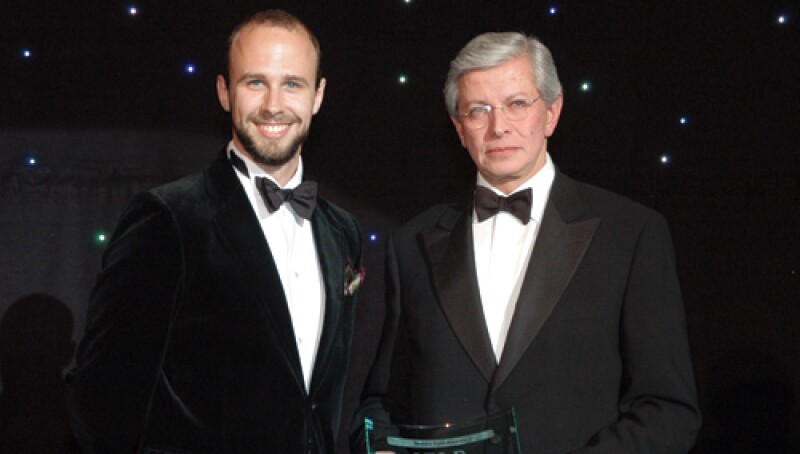
|
Helmy Hamza again scoops a national award for its work in Egypt. This year the firm counselled TMG, a real estate company, on its IPO in Cairo and Alexandria, represented National Bank of Kuwait Capital on its acquisition of Al Watany Bank of Egypt, and assisted the banks on refinancing the Port Saïd and Suez Gulf power projects.
On the right, Simon Crompton, editor of IFLR, presents the award for Egyptian law firm of the year to Taher Helmy of Helmy Hamza & Partners, in association with Baker & McKenzie
Kuwait – Bader Saud Al-Bader & Partners
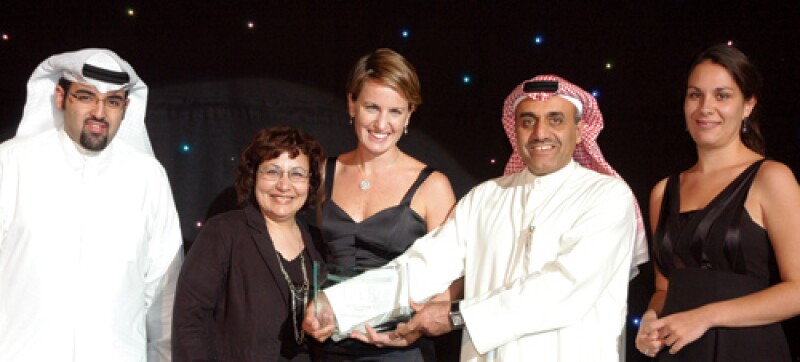
|
Bader Saud Al-Bader worked on two shortlisted transactions this year. The firm assisted the banks on the financing of the Karo Aromatics project as well as Project Genesis, Global Investment House's GDR issue. Advice was also provided to Burgan Bank on its acquisition of United Gulf Bank's holdings in four overseas banks.
Oman – Trowers & Hamlins
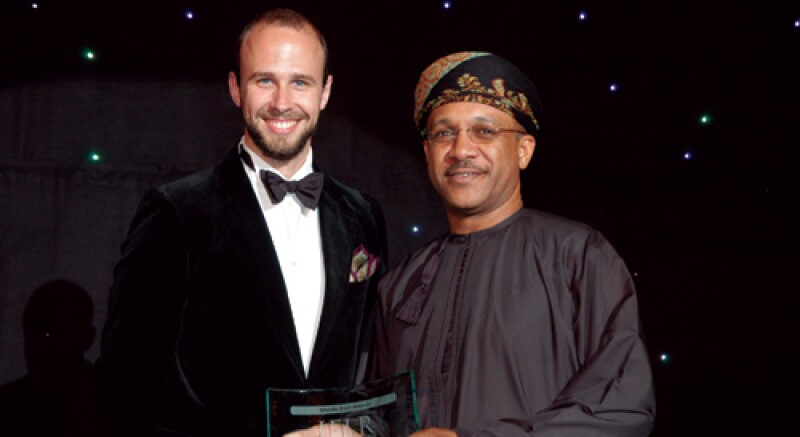
|
Trowers & Hamlins' Middle East expertise was evident this year in Oman. The firm counselled Ahli United Bank on an acquisition of 35% of the shares in Alliance Housing Bank through a private placement, as well as assisting Bank Dhofar on a $75 million syndicated loan provided as Tier 2 debt which required a review of Basel II capital requirements.
Above, Trowers & Hamlins' resident managing partner in Oman, Majid Al-Toky, receives his award from IFLR editor Simon Crompton.
Qatar – Eversheds
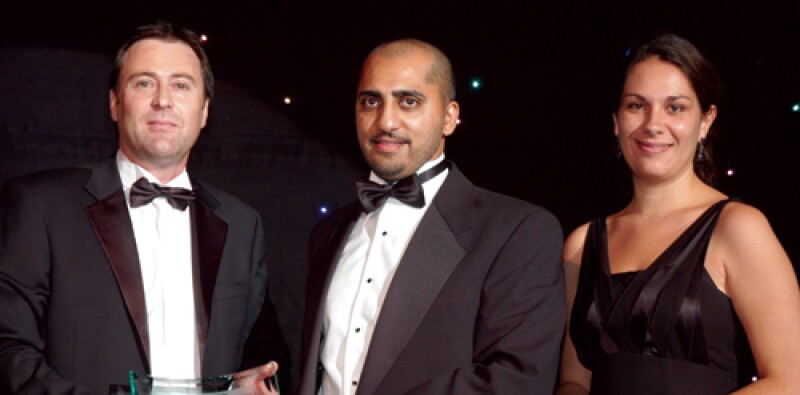
|
Eversheds' Qatari office worked closely with the rest of the firm's network on several interesting transactions this year. The firm assisted Qatar National Bank on a debt and equity investment on London's Shard of Glass development, as well as several important local deals.
On the left, Chris Jobson and Amjad Hussain (far left and centre) receive their award from IFLR's Rachel Evans.
Saudi Arabia – Al Jadaan & Partners
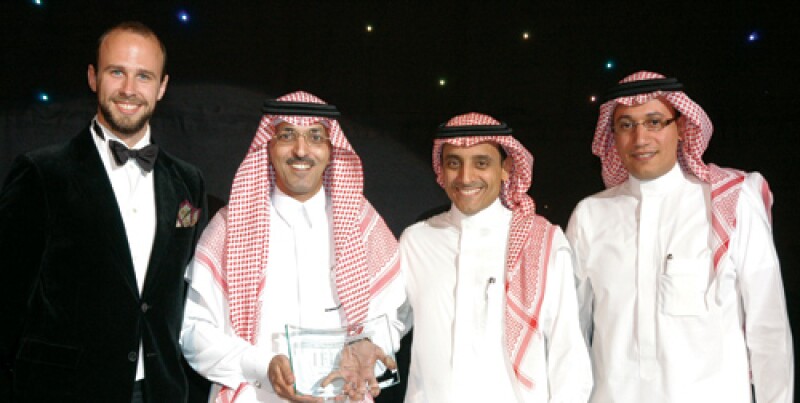
|
Al Jadaan had another amazing year, working on six of IFLR's shortlisted deals. Highlights include the firm's work on three project finance deals of the year as well as its assistance on SEC's sukuk, Sipchem's rights issue, and the privatisation of Saudia catering.
On the left, IFLR's Simon Crompton congratulates Mohammed Al-Jadaan, Khalid Al-Abdulkareem and Fahad Abuhemid (left to right).
UAE – Al Tamimi & Company
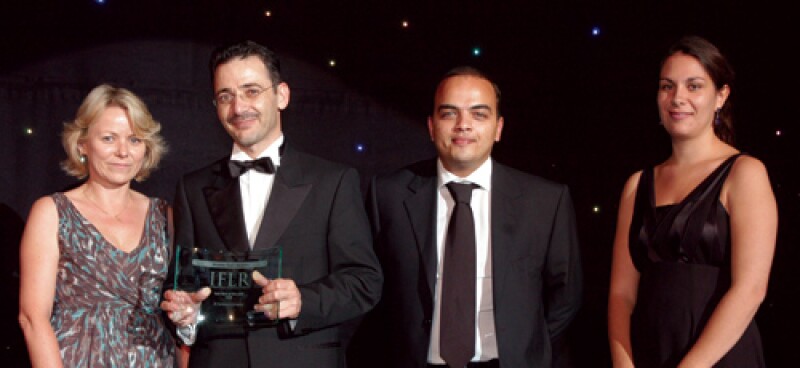
|
Al Tamimi advised on most major equity deals in the UAE this year. As a result, the firm picked up a nomination for equity team of the year as well as for the Depa and DP World IPOs. These were two of the most innovative equity offerings in the UAE this year.
In the photo opposite, from the left are Lynette Brown, Husam Hourani and Mohamed Khodeir of Al Tamimi, with IFLR's Rachel Evans.
